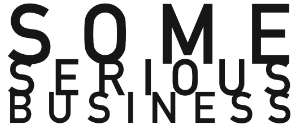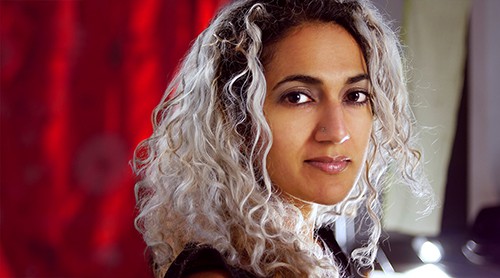Photo credit: Josh Steinbauer
Some Serious Business presents #FiftyQuestions to highlight folks who are creating, presenting, questioning and critiquing. Each featured artist picks a handful of questions to answer.
19- Who has been your greatest mentor, living or dead, real or imaginary?
I don’t think I could pick just one, and all of my arty heroes are marvelously alive. In 2001, I started an MFA program in writing at the University of San Francisco, and took the first of many writing workshops. Some people have the gift of being able to support an artist’s intention and process while giving deep and productive critiques of her work. My thesis advisor and author, Stephen Beachy, as well as a fellow student in my nonfiction classes, Mary Patrick, both have this ability in spades. It’s how I was able to bring the first version of my memoir into being, and it’s a skill I would love to learn to do better myself.
In 2011, I took a workshop at the Millay Colony with the multi-talented artist Nina Katchadourian. What blew me away was how wide ranging her projects were – she picked them by thinking about what she was interested in. If it included something she didn’t know much about, she’d set about learning it herself, or collaborating with those more expert. I don’t know if I am rebel enough to step into a completely new genre or medium, but knowing her makes me reach further in the fields I know a bit already.
In 2013, I met my partner, the filmmaker and musician Josh Steinbauer. Learning more about filmmaking and its massively collaborative, time and equipment intensive process was eye opening. It makes being a writer look easy. All I have to do is sit down with a piece of paper and a pen. What I find most inspiring is his often experimental, surreal, and playful approach to storytelling. You might not know where it’s going, but you want to keep watching. It’s like some of the best poetry. It nudges you to let go, let the work lead you, stay in the moonstruck moment.
28- When does Joy tend to visit you?
There are predictable times of joy, like when I’m dancing, even if just in my living room by myself in the dark. Or when I’ve finished writing a poem. Sometimes when I’m walking, I feel it when I remember what a gift it is to walk without pain, an understanding borne of my own past injuries, and seeing others, mostly elders, move with that staccato motion that comes with age and illness. I also love the moment right before I fall asleep. It’s a relief to know that I’m letting go, that decisions don’t have to be taken anymore, that they will wait til I’m awake, and like the old Russian folktales say, morning is wiser than the evening.
49- If you could be anything besides an artist in human form, what would you like to be?
I was a teenager when I fell in love with being a dancer. First it was Madonna’s back up dancers on her lithe and leather music videos. Then it was the Solid Gold TV show (can you tell I’m a child of the 80s?). But the breakthrough inspiration was In Living Colour, where they’d intersperse the comic bits with dance numbers – with heart poundingly hot girls in booty shorts and big hair and fuck they could dance. JLo, you were among my first idols.
If my alternate universe gave me better knees AND more courage to defy the traditional South Asian Muslim immigrant career tracks, that’s where I’d be. On stage, behind the lime light, all synchronicity, rhythm, and flair.
ABOUT ABEER Y. HOQUE
Abeer Y. Hoque is a Nigerian born Bangladeshi American writer and photographer. She likes sodium lighting, clementines, and the end of the current US administration. It can’t come soon enough. Her books include a travel photography and poetry monograph (The Long Way Home, 2013), a collection of linked stories, poems, and photographs (The Lovers and the Leavers, 2015), and a memoir (Olive Witch, 2017). See more at olivewitch.com.
WORK SAMPLE |Inside History | By ABEER Y. HOQUE
It took me my entire life to realise this: your grasp of language changes who you are. I used to think that language was a natural extension of a person. Living in Dhaka and my father’s visit changes all that. During our time together, my father and I speak almost wholly in English. We do this in America too, which is one of the reasons my Bangla is piss poor.
In the middle of our conversation, Abbu calls over to our driver in Bangla, ‘Ey, Sohel mia!’
‘Hah, sir!’ Sohel replies.
‘Your horn’s voice is broken. Won’t you fix it so it can sing again?’
And Sohel and I are unable to respond because we’re cracking up.
In America, Abbu is the professor, stern, meticulous, formal. But that’s in English. In Bangla, he swings from proper to patois and his angle never fails to surprise me. It’s true that everyone contains multitudes. I just hadn’t known that my father is also a jokester.
If I judged myself accordingly, in Bangla, I am a simpleton. My gaps in vocabulary force me to dance around topics, go off on tangents, sometimes avoid the very thing I want to talk about. It’s hardest with my paternal cousins who don’t speak English as well. When I was young and visiting Bangladesh in the summers, this didn’t matter. It is as an adult that I become a stranger to my cousins, and they to me. After they overcome their initial shyness, they are insatiably curious. But I am hard pressed to answer their endless questions, in Bangla no less. Who is it I’m holding a candle for in America? There must be someone. Who wouldn’t choose to get married, after all?
One of my cousin’s wives gets my love of travelling as she’s the only one who’s left Bangladesh’s borders. But she thinks I might want to be a nomad forever, which is not the case. Another sees why I might not want to start a family. But she probably doesn’t know the importance I place on commitment and loyalty.
‘You’re alone!’ sings the dismayed chorus.
‘I’m different,’ is my reply, prompting laughter all around.
They’re laughing because the word I used, onnorokom, also means crazy, like in a bad mental way. I know this. I’m trying to acknowledge that I’m not who they want me to be, since there isn’t any hope of explaining my reservations about wifedom. Not in Bangla anyway. In my father’s mother tongue, I leave the impression that I don’t know what I want, and perhaps haven’t even understood the matter altogether.
When Abbu returns to the States, I find myself bereft. He’s taken with him his encyclopaedic knowledge about Bangladesh, but what strikes me most when he leaves is that he calls it going home. Even though there is no doubt in his mind where he’s from.
This doesn’t mean he’ll ever understand my life as a Nigerian-born Bangladeshi American. What it does mean is that he forgives me my linguistic lapses. Despite our differences, he knows there is more to me than what I’m saying and how I say it. Personal experience has taught us both that language is elemental – describing who we are, yet telling only part of the story.

